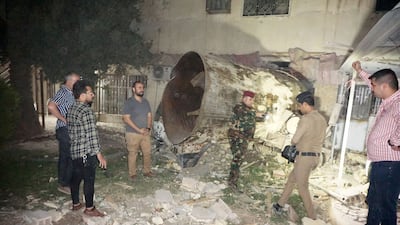Nine people were killed on Saturday night when a gas tanker exploded in a residential area of Baghdad.
Thirteen were wounded in the explosion in the capital’s eastern Binok neighbourhood, the government said.
Prime Minister Mohammed Shia Al Sudani ordered an investigation into the incident.
Initial reports suggested a “technical failure” was to blame, Iraqi security forces said.
The tanker was in a car park. The explosion, which was heard across the capital, blew out the windows of nearby buildings and shrapnel caused damage to other vehicles.
“We were at home and felt a very strong blast and a smell of gas,” Mohammed Aziz, who lives 100 metres from the site of the explosion, told AFP.
“It felt like we were suffocating,” he said. “Our doors and windows were blown out.”
President Abdul Latif Rashid said in a statement that he was "closely following the explosion," calling on the concerned authorities to "investigate the incident and hold the negligent accountable".
The UN mission to Iraq expressed condolences and wished the injured a speedy recovery.
"Thorough investigation into cause and circumstances of this horrific incident must lead to accountability and prevention," the mission said in a statement.
The explosion happened two days after Parliament confirmed Mr Al Sudani's government after more than a year of political deadlock. He took office on Friday afternoon.
The stalemate that followed the October national elections last year threatened the country's stability, leading to bloody clashes among Shiite militias in Baghdad and some southern provinces.
Safety standards in both the transport and construction sector are frequently flouted in Iraq, and accidents are common. Widespread corruption and weak government monitoring are blamed for the lack of proper safety standards in many of Baghdad's neighbourhoods.
High profile disasters in recent years include two hospital fires in Baghdad and the southern city of Nasiriyah leading to hundreds of deaths, with both incidents blamed on poor storage of highly flammable oxygen and faulty electrical wiring.
The Baghdad hospital fire in April last year caused a political storm and led to the resignation of the health minister, but prosecution for health and safety failures is rare.
Despite taking billions in oil revenues each month, Iraq's infrastructure, including roads and bridges, is in disrepair. Many roads are full of potholes and are plunged into darkness at night, causing car accidents.
Last month, a woman, her two-year-old daughter, and a man were killed and 13 wounded when a multi-story building collapsed in Baghdad.
Officials blamed the owner for not obeying construction codes.
In August, seven people were killed after a landslide caused a partial collapse of a Shiite shrine outside the city of Karbala, south of Baghdad.


